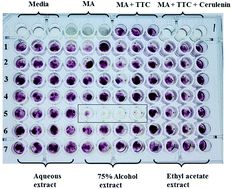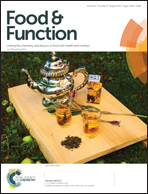Clove extract functions as a natural fatty acid synthesis inhibitor and prevents obesity in a mouse model†
Abstract
Numerous medicinal plants have been reported to prevent various chronic diseases. In this study, we screened a new FASN inhibitor-alcohol extract of clove (AEC) using a fast microplate method developed in our laboratory. The major components of AEC were: eugenol (42.27%), acetyl eugenol (29.12%), caryophyllene (15.40%), and humulene (3.22%). Fatty acid synthase (FASN) is a key enzyme for de novo lipogenesis, and it has been suggested as a potential therapeutic target in cancer and obesity. We have tested the ability of AEC to inhibit FASN in mammalian cells and tissues. Furthermore, we found that AEC as a FASN inhibitor could inhibit the S-phase DNA replication of HepG2 cells and adipocyte differentiation of OP9 cells. AEC also limited the development of high fat diet (HFD) induced obesity. AEC supplementation significantly reduced body weight and abdominal adipose tissue weight, lowered lipid accumulation in the liver and epididymal adipose tissue compared with the HFD control group. The serum lipid profiles showed that AEC could regulate the content of total triglyceride (TG), low-density lipoprotein cholesterol (LDL-C). Collectively, our data suggest that FASN inhibitor AEC is a potential therapeutic agent for obesity.



 Please wait while we load your content...
Please wait while we load your content...